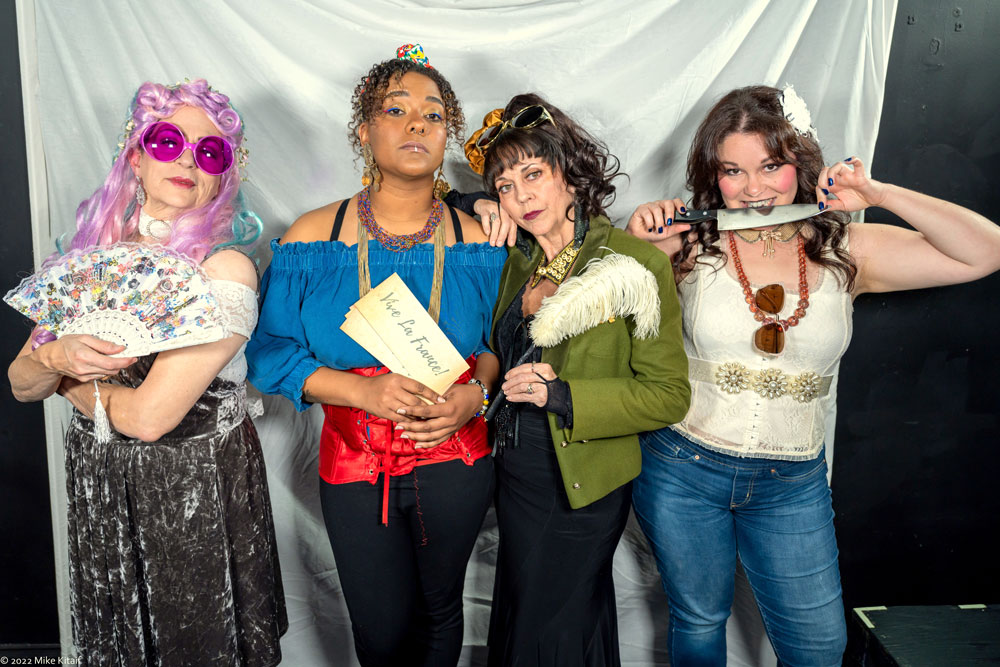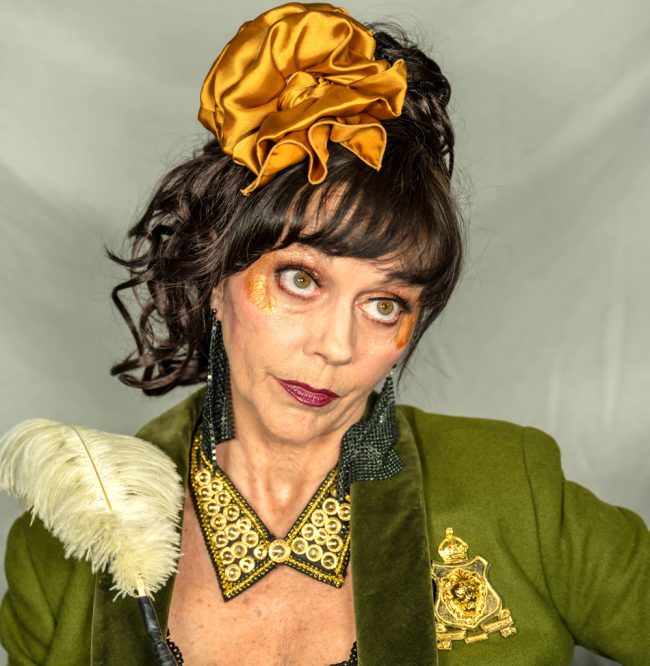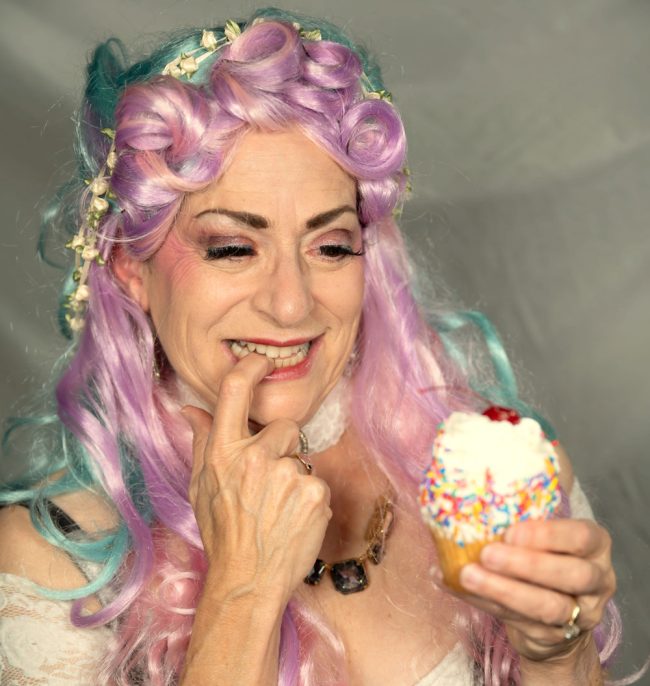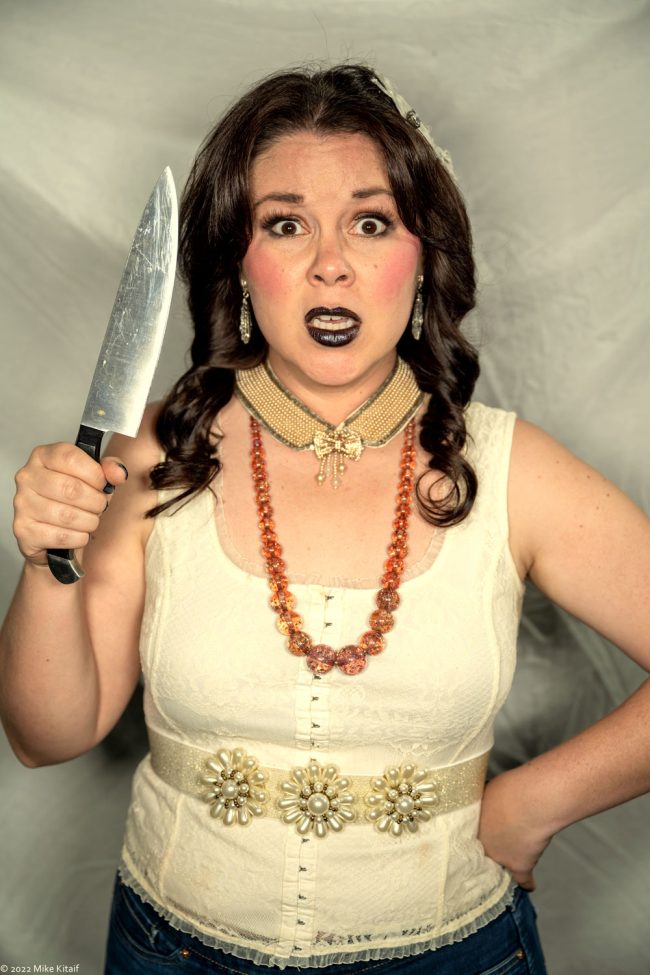
How badass are the women of “The Revolutionists,” playwright Lauren Gunderson’s self-described “brutiful . . . feisty feminist comedy” that Palm Coast’s City Repertory Theatre will stage March 18-27?
Yes, Gunderson herself deploys the term “badass” on her website to describe her four female characters – three of whom, including Marie Antoinette, are historical personages. The 2016 play follows the women as they navigate the chaos, intrigue, treachery and murderous violence of France’s Reign of Terror in 1793 Paris.
But it is actual history, and not the playwright’s fanciful imagination, that tells us this (spoiler alert!): At the execution of the assassin Charlotte Corday, one of the foursome, a bystander lifted her freshly guillotined head and slapped her face for being a traitor – and Corday’s expression promptly turned to indignation.
(French writer Albert Camus recounts the incident in his 1957 essay “Reflections on the Guillotine”: “Charlotte Corday’s severed head blushed, it is said, under the executioner’s slap.”)

Along with Corday (played by Angela Young), Gunderson’s dramatis personae are playwright Olympe De Gouge (played by Leigh Ann Singleton), deposed queen Marie Antoinette (Julia Truilo) and Haitian rebel Marianne Angelle (Phillipa Rose). While Angelle is a composite character representing the subjugated Africans of the French colony of Saint-Domingue (later known as Haiti), the other three characters can all be found in history books.
And Corday’s handiwork can be seen in the “The Death of Marat,” the shocking, disturbing, renowned 1793 painting by Jacques-Louis David that depicts Corday’s bathtub murder of journalist and French Revolution leader Jean-Paul Marat. (Let’s not forget that Marat, among the most distasteful characters to walk the planet, had exulted in the infamous saying, sacrifice 200,000 heads, and you will save a million. To Which Corday at her trial rejoined: “I killed one man to save a hundred thousand.”)
Wait a minute . . . Guillotine executions, assassinations, Marie “let them eat cake” Antoinette? This is a comedy?
Even as Singleton begins to champion Gunderson’s play – “There’s so many questions that are raised: Is theater relevant? Is art relevant? Are these actions relevant? What would you stand for, and what would you die for?” – director John Sbordone bum-rushes the round-table interview with mock anger: “It’s a fucking comedy! Don’t make it serious! We want people to come see it!”

Indeed, Sbordone has the backing of Gunderson herself, who goes beyond the “feisty feminist comedy” tag on her website to proclaim, in the notes section of the official script, that “The play is mostly a comedy. The play is based on real women, real transcripts and real executions. But remember it’s a comedy.”
To make sure that theater-goers who don’t have access to the script get it, the play opens with the ghastly swish and clatter of a plunging guillotine, followed by the ruminations of Madame De Gouge–whose neck became intimately acquainted with the guillotine’s blade–as she works on her next play: “Well, that’s not a way to start a comedy. With an execution? That’s just basic dramatic writing: Don’t start with beheadings. Audiences don’t want plays about terror and death. No, they want . . . hope. Yes, I have to write about . . . grace and power in the face of crisis. Artistic defiance. Yes. That’s good. There we go.”
“I’ve been researching Olympe De Gouge, who was a writer, feminist and political activist,” Singleton says. (De Gouges, whose voice was a beacon for human rights, is among the great underrated figures of the French Revolution. She wrote the Declaration of the Rights of Women, which included the then-revolutionary call for equality in marriage, and was among the staunchest advocates for the end of slavery in France’s colonies.)
“She did write dramas and Gunderson put some of those words into this play.”
Yet, as De Gouge’s opening soliloquy attests, “The Revolutionists” is not a documentary or any sort of historical work in the traditional sense. A leitmotif of the play is that Marie Antoinette, Charlotte Corday and Marianne Angelle – concerned about their places in history as they face the possibility of becoming intimately acquainted with “Madame Guillotine” – implore De Gouge to “rewrite” their lives so that they will be more favorably portrayed in future chronicles.
Visitors to Gunderson’s website will notice that the irreverent wit and hip word-play of the 40-year-old’s commentary there have spilled into her characters’ conversations, reflections and actions.
“I’m rebelling against slavery and you’re battling writer’s block,” Angelle snaps at De Gourge at one point.
“I’m not blocked,” De Gouge replies. “I’m just . . . mentally . . . hibernating. There’s a lot of pressure to write something profound these days. And then I keep thinking if I come up with a good title it’ll get me started. Something tantalizing but really vague like . . . ‘The Revolutionists.’ ”
“You could do better,” Angelle says.
“This show uses modern language instead of stylized language,” says Young, who describes her Charlotte Corday as “the young assassin virgin” who, since leaving a nunnery, is “kind of a hothead” who “cusses like a sailor. The language is so plain that it hits you as an audience member differently than if she used more flowery language.”
Costumes will be “steampunk style — extraordinarily un-historic,” Sbordone says.

And, as the repartee of De Gourges and Angelle reveals, “The Revolutionists” boasts 21st-century levels of snark and is gleefully meta — extremely self-aware, self-reflective and self-referential. (Although Nobel-winning, Italian absurdist playwright Luigi Pirandello beat Gunderson in the meta-theater stakes with his 1921 masterpiece, “Six Characters in Search of an Author.”)
While Gunderson uses the “F’ word – feminist—to describe her play and her “badass” quartet of heroines, Sbordone and company realize that word may make some people balk.
But any such potential patrons “don’t come to our theater anyway,” Sbordone shrugs, alluding to City Repertory Theatre’s storied, decade-plus track record of taking community theater beyond the safe and predictable (see David Ives’ “Venus in Fur,” Athol Fugard’s “Blood Knot,” David Mamet’s “Race” and many more.)
“ ‘The Revolutionists’ is really human rights,” Sbordone says. “And come on – we’re in the 21st century.”
“It’s about empowerment too, and it’s about making decisions and standing for what you believe in, not just as a female but as a human being,” Singleton says. “So it’s really human rights, not just feminist. It’s for all people, but yes that word will definitely make people say ‘Wait a second.’ ”
As brash as Gunderson is in staking out feminist cred for her play, she’s even more bombastic in tossing her work into the political arena.
“Hell yes this is political,” she says on her website. “The play is about a moment in history where the rich and poor were lightyears apart in lifestyle, the country was in multiple wars, the debt was huge, the workers overtaxed, trust in the government was nil, the leaders were corrupt and greedy, racism, sexism, poverty, violence, extremism. The only difference between them and us is the year and the continent.”
Singleton agrees: “Has anything really changed? That is so sad, isn’t it, that we still deal with these issues. Just like they did back then.”
–Rick de Yampert for FlaglerLive
![]()
City Repertory Theatre will stage “The Revolutionists” at 7:30 p.m. March 18-19 and 25-26, and at 3 p.m. March 20 and 27. Performances will be in CRT’s black box theater at City Marketplace, 160 Cypress Point Parkway, Suite B207, Palm Coast. Tickets are $20 adults and $15 students, available at crtpalmcoast.com, by calling 386-585-9415, or at the venue just before showtime.






























Leave a Reply